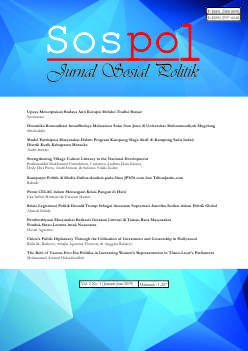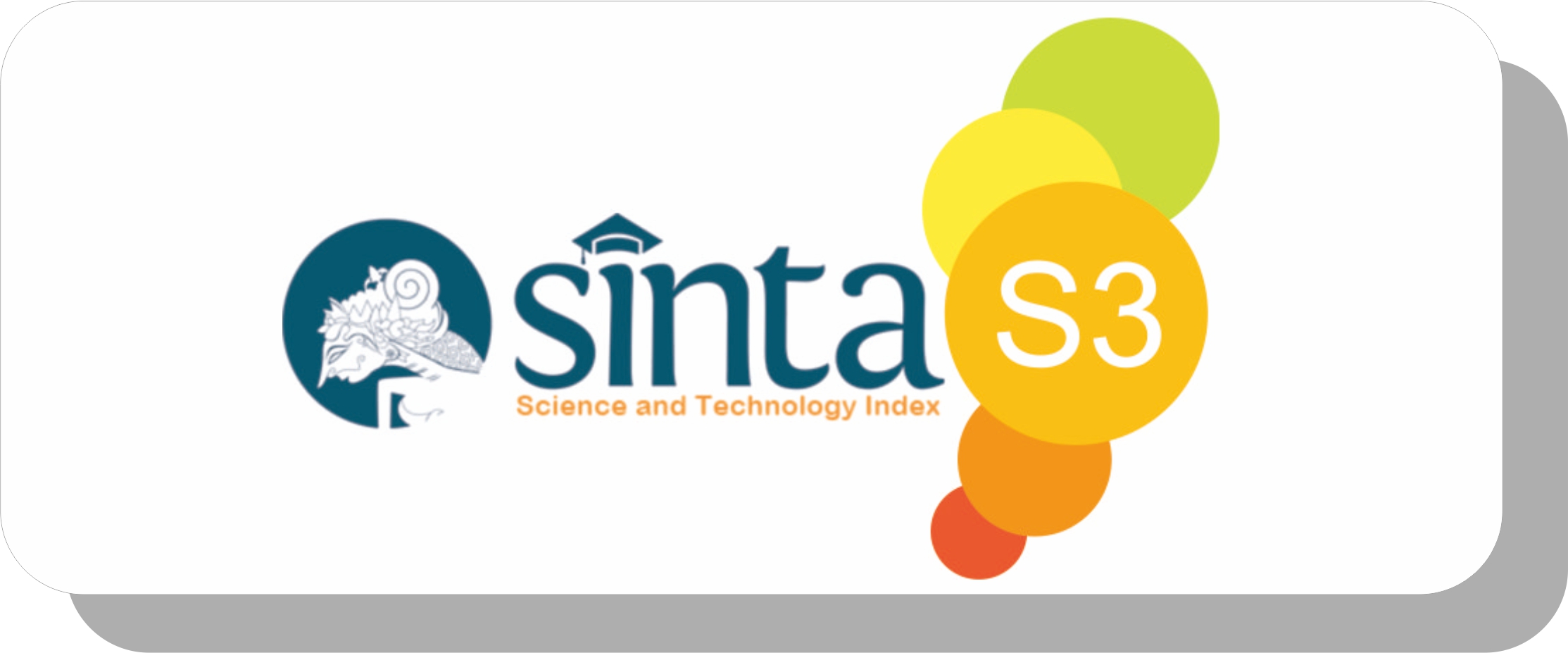Upaya Menciptakan Budaya Anti Korupsi melalui Tradisi Banjar
DOI:
https://doi.org/10.22219/sospol.v5i1.6827Keywords:
Anti-Corruption, Banjar, Culture, Local Wisdom, LombokAbstract
Corruption crimes have long occurred in Indonesia and the perpetrators are not infrequently involving various groups of societies. Whereas preventive measures have not focused much directly on civil society. Therefore, the purpose of this research is to uncover the efforts to develop an anti-corruption culture in the community through the implementation of the banjar. This study uses a qualitative approach to the case study method. Data are obtained through interviews and literature studies. Data analysis techniques use the Miles and Huberman model. The result of the study shows that the implementation of banjar is one of the community's efforts to cultivate anti-corruption values. The suggestions that the writer can give are based on the results of this study, namely: 1) Indonesian people are rich in local wisdom which contains positive values including the implementation of this banjar so that it must be preserved; 2) the cultivation of the value of anti-corruption through the implementation of banjar is an experience that can be a reference in learning in formal education in schools and universities so that it has sustainable benefits
Downloads
References
Buku
Angraeni, Sari. (2016). Program Pencegahan Korupsi Berbasis Keluarga. Jakarta: KPK.
Creswell, John. (2015). Riset Pendidika: Perencanaan, Pelaksanaan, dan Evaluasi Riset Kualitatif & Kuantitatif. Yogyakarta: Pustaka Pelajar.
Lickona, Thomas. (2015). Character Matters Persoalan Karakter Bagaimana Membantu Anak Mengembangkan Penilaian yang Baik, Integritas, dan Kebajikan Penting Lainnya. Diterjemahkan oleh Juma Abdu Wamaungo & Jean Antunes Rudolf Zien. Jakarta: Bumi Aksara.
Jurnal
Kristanto, Nurdien Harry. (2015). Tentang Konsep Kebudayaan. Sabda: Jurnal Kajian Kebudayaan, Vol. 10(2), Hlm. 1-11. https://ejournal.undip.ac.id/index.php/sabda/article/viewFile/13248/10033
Nurinten, Dinar, dkk. (2016). Kearifan Lokal Sebagai Media Pendidikan Karakter Antikorupsi pada Anak Usia Dini Melalui Strategi Dongkrak. Jurnal Integritas Vol. 2(1), Hlm. 135-154, https://jurnal.kpk.go.id/index.php/integritas/article/download/128/26/s
Rahardjo, Mudjia. (2017). Studi Kasus dalam Penelitian Kualitatif: Konsep dan Prosedurnya. https://core.ac.uk/download/pdf/80816930.pdf
Rahmatiani, Lusiana. (2016). Nilai Kearifan Lokal Sunda sebagai Basis Tata Kelola Pemerintahan yang Baik (Good Governance). Civics, Vol. 1(1). Hlm. 81-88. http://journal.ubpkarawang.ac.id/index.php/PPKn/article/download/30/29
Rahmatulloh, Johan. (2017). Legalitas Kewenangan Penyelenggara Pendidikan dalam Menarik Pungutan di Satuan Pendidikan Dasar. Integritas, Vol. 3(2). Hlm. 137-156. https://jurnal.kpk.go.id/index.php/integritas/issue/view/7/Jurnal-INTEGRITAS-Volume-3-No-2-tahun-2017
Rizal, Moch. Choirul dan M. Lutfi Rizal Farid. (2017). Pitutur Luhur untuk Pemberantasan Korupsi di Indonesia dalam Perspektif Kebijakan Hukum Pidana. Refleksi Hukum Jurnal Ilmu Hukum, Vol. 2(1), Hlm. 33-50. http://ejournal.uksw.edu/refleksihukum/article/view/1250/848
Rusdi, Mughny Ilman Wali dan Susanti Prasetyaningrum. (2015). Nilai Budaya Siri’na Pacce dan Perilaku Korupsi. Jurnal Indigenous, Vol. 13(2), Hlm. 68-86. http://journals.ums.ac.id/index.php/indigenous/article/view/2619/1722
Saifulloh, Putra Perdana Ahmad. (2017). Peran Perguruan Tinggi dalam Menumbuhkan Budaya Anti Korupsi di Indonesia. Jurnal Hukum & Pembangunan Tahun ke-47, no. 4. Hlm. 459-476. http://jhp.ui.ac.id/index.php/home/article/download/1591/1468
Santoso, Listiyono dan Dewi Meyrasyawati. (2015). Model Strategi Kebudayaan dalam Pemberantasan Korupsi di Indonesia. Jurnal Review Politik, Vol. 05(01), Hlm. 22-45. http://jurnalpolitik.uinsby.ac.id/index.php/jrp/article/view/58/58
Setiyono, Budi. (2017). Memahami Korupsi di Daerah Pasca Desentralisasi: Belajar dari Empat Studi Kasus. Politika, Vol. 8 (1), Hlm. 27-62. https://ejournal.undip.ac.id/index.php/politika/article/viewFile/16354/11974
Artikel Daring
Alhamid, Thalha dan Budur Anufia. (2019). Resume: Instrumen Pengumpulan Data. Diakses 18 Maret 2018, pada https://osf.io/s3kr6/download/?format=pdf
Budiawati, Arie Dwi. (2018). Daftar Terbaru Negara Terkorup, Indonesia Rangking Berapa?. Diakses 21 Juli 2018, pada https://www.dream.co.id/unik/daftar-terbaru-negara-terkorup-indonesia-ranking-berapa-180223d.html
Fauziyah, Fitri. (2015). Nilai-Nilai Pendidikan Antikorupsi dalam Alqur’an: Kejujuran, Tanggung Jawab dan Kesederhanaan. Diakses 21 Juli 2018, pada http://eprints.ums.ac.id/39791/1/NASKAH%20PUBLIKASI.pdf
Gabrillin, Abba. (2018). Dalam 2 Tahun, 11 Kepala daerah di Jatim jadi Tersangka Kasus Korupsi. Diakses 15 Maret 2018, pada https://nasional.kompas.com/read/2018/10/10/05283531/dalam-2-tahun-11-kepala-daerah-di-jatim-jadi-tersangka-kasus-korupsi?page=all
Hariyanto, Ibnu. (2017). ICW: Dalam 6 Bulan, 226 Kasus Korupsi Rugikan Negara Rp 1,83 T. Diakses 15 Maret 2019, pada http://news.detik.com/berita/d-3621894/icw-dalam-6-bulan-226-kasus-korupsi-rugikan-negara-rp-183-t
ICW. (2017). Kasus Korupsi di Provinsi. Diakses 15 Maret 2019, pada https://antikorupsi.org/id/content/kasus-korupsi-di-provinsi
ICW. (2017). Korupsi Dana Desa & Kepala Daerah 2017. Diakses 15 Maret 2019, pada https://www.antikorupsi.org/id/content/korupsi-dana-desa-kepala-daerah-tahun-2017?width=1000&height=700
Prayitno, Joko Dwi. (2016). Kepedulian Mahasiswa UNNES terhadap Program Konservasi Universitas Negeri Semarang. Diakses 15 Maret 2019, pada https://lib.unnes.ac.id/27325/1/3201412052.pdf
Rahmawati, Fitria. (2017). Sepanjang 2017, Tim Saber Pungli Tangkap 2426 Tersangka. Diakses 15 Maret 2019, pada https://nasional.tempo.co/read/1029454/sepanjang-2017-tim-saber-pungli-tangkap-2-426-tersangka
Undang-Undang dan Peraturan Pemerintah
Undang-Undang Republik Indonesia Nomor 20 Tahun 2001 Tentang Pemberantasan Tindak Pidana Korupsi
Undang-Undang Republik Indonesia Nomor 31 Tahun 1999 Tentang Pemberantasan Tindak Pidana Korupsi.
Hasil Wawancara
Anep, warga Suku Sasak. Data diambil pada tanggal 19 Juli 2018.
Dwi Febriyanti, warga Suku Sasak. Wawancara pada tanggal 19 Juli 2018.
Nurun Hidayati, warga Suku Sasak. Wawancara pada tanggal 17-19 Juli 2018.
Downloads
Published
How to Cite
Issue
Section
License
Authors who publish with this journal agree to the following terms:
- Authors retain copyright and grant the journal right of first publication with the work simultaneously licensed under a Creative Commons Attribution-ShareAlike 4.0 International License that allows others to share the work with an acknowledgement of the work's authorship and initial publication in this journal.
- Authors are able to enter into separate, additional contractual arrangements for the non-exclusive distribution of the journal's published version of the work (e.g., post it to an institutional repository or publish it in a book), with an acknowledgement of its initial publication in this journal.
- Authors are permitted and encouraged to post their work online (e.g., in institutional repositories or on their website) prior to and during the submission process, as it can lead to productive exchanges, as well as earlier and greater citation of published work (See The Effect of Open Access).

This work is licensed under a Creative Commons Attribution-ShareAlike 4.0 International License.



















